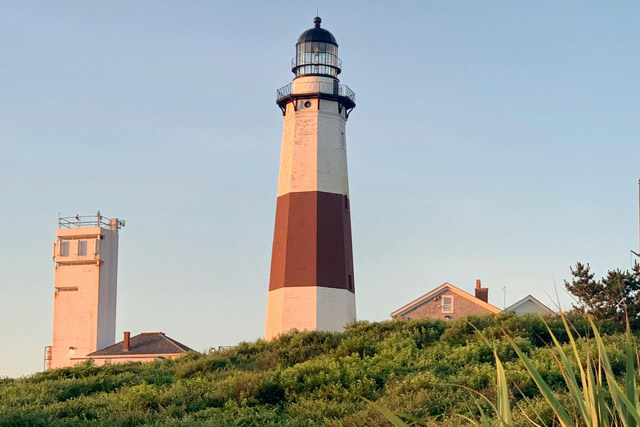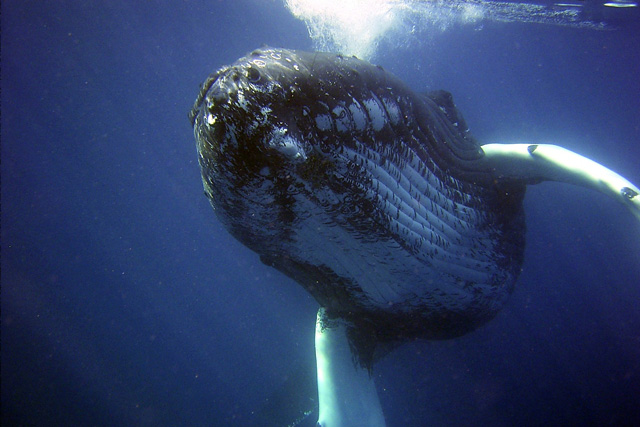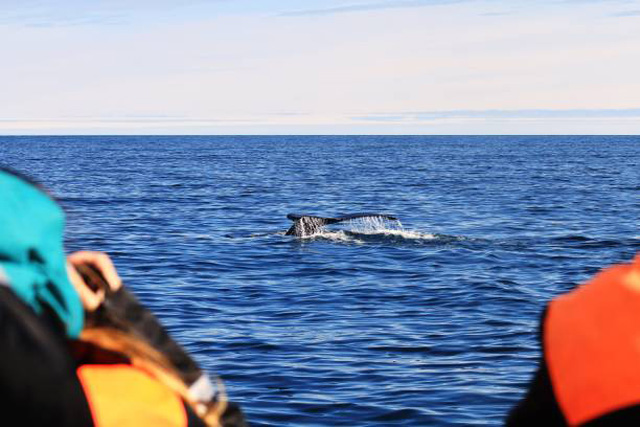Whale watching in Montauk is an incredible way to connect with nature and witness majestic creatures in their natural habitat. But with this privilege comes responsibility. It’s up to us to ensure that our activities don’t harm the very animals we admire. This guide will teach you how to engage in responsible whale watching while helping preserve Montauk’s vibrant marine ecosystem.
Understanding Whale Behavior and How it Helps Responsible Whale Watching
Knowing how whales behave is key to appreciating and protecting them. Whales use a variety of behaviors, like breaching and spyhopping, to communicate and feed. By understanding these actions, we can better avoid disruptions that could negatively impact them.
Notable Whale Behaviors
- Breaching: Whales leap out of the water, possibly for communication, removing parasites, or play.
- Spyhopping: Whales raise their heads above water to look around, often assessing their surroundings.
- Tail Slapping: A loud splash created by slapping their tail, signaling danger or marking territory.
- Lunging: Fast movements during feeding, often seen in humpbacks.
Understanding these actions ensures we respect their space while enjoying their magnificence.
Fun Fact!
Blue whales, the largest animals on Earth, have hearts as large as a small car and can pump over 60 gallons of blood with every beat.
Key Practices for Responsible Whale Watching

- Choose an Eco-Certified Tour Operator: Support companies that follow strict guidelines for sustainability.
- Keep a Safe Distance: Federal guidelines recommend staying at least 100 yards from whales.
- Limit Viewing Time: Watch whales for no more than 30 minutes to minimize stress.
- Avoid Encircling Whales: Never box in whales or obstruct their paths.
- Travel at Slow Speeds: Avoid sudden movements or high-speed boating near whales.
- Respect Mothers and Calves: Keep extra distance from mother-calf pairs, as they are particularly vulnerable.
- Follow the Leader: Observe the whales’ behavior to determine your next move. If they dive or swim away, don’t follow.
- Use Binoculars: View from a distance with binoculars to reduce your impact.
- Educate Yourself Beforehand: Learn about Montauk’s whale species and their behaviors to ensure a more informed experience.
- Keep Noise Levels Down: Avoid loud noises and revving engines near whales.
- Support Local Conservation: Donate to Montauk’s marine conservation groups.
- Avoid Feeding Wildlife: Feeding marine animals can disrupt their natural diet and behavior.
- Pack Out Trash: Leave nothing behind to prevent marine debris from harming wildlife.
- Be Patient: Don’t rush the experience; let the whales’ natural behaviors guide the encounter.
Montauk’s Role in Whale Conservation

Montauk’s waters are part of a vital marine ecosystem, hosting humpback, fin, and minke whales during their migrations. These nutrient-rich waters also sustain prey species like krill and fish, making Montauk an essential stop for whales. Local organizations like the Atlantic Marine Conservation Society actively monitor and protect this ecosystem through research, rescue efforts, and education.
Montauk is also a hub for public engagement in marine conservation. Annual events, educational programs, and beach clean-ups allow residents and visitors alike to contribute to preservation.
Pro Tip!
Participate in local whale-watching tours that donate a portion of proceeds to conservation efforts, ensuring your trip benefits marine life.
How Visitors Can Help Protect Whales

Whale watchers visiting Montauk can take a variety of steps to protect whales and promote eco-friendly whale watching. I have put together the following list:
- Understanding Whale Watching Regulations
Montauk operates under strict guidelines to protect whales and other marine life. Familiarize yourself with local and federal regulations, such as the Marine Mammal Protection Act, which mandates safe viewing distances and prohibits activities that disturb marine animals. Most guidelines recommend staying at least 100 feet (30 meters) away from whales to minimize stress on the animals. - Support Ethical Whale Watching Tours
Choose operators that adhere to responsible practices, such as using quiet engines to reduce underwater noise pollution and limiting the number of boats around a pod. Ethical operators prioritize the well-being of the whales over profit, ensuring that their activities do not interfere with natural behaviors like feeding or nursing. - Educate Yourself on Whale Behavior
Before embarking on a tour, take time to learn about whale behaviors, such as breaching, lobtailing, and spyhopping. Understanding these actions helps you appreciate their natural habits while avoiding any actions that might provoke or disturb them. - Minimize Your Carbon Footprint
Reducing your environmental impact starts before you even set sail. Consider carpooling or using public transportation to Montauk, and opt for eco-friendly whale watching operators who invest in energy-efficient boats or contribute to marine conservation initiatives. - Avoid Littering and Pick Up Trash
Marine debris poses a significant threat to whales and other marine species. Always dispose of trash properly and pick up any litter you see, even if it isn’t yours. A single piece of plastic can have devastating consequences for marine life. - Use Biodegradable Sunscreen
Sunscreens containing harmful chemicals can wash off into the ocean, potentially affecting marine ecosystems. Choose biodegradable, reef-safe sunscreens that protect your skin without harming aquatic life. - Contribute to Whale Conservation Programs
Donate to or volunteer with organizations that focus on marine conservation, such as the Atlantic Marine Conservation Society or other local groups in Montauk. These groups work tirelessly to protect whales through research, rescue efforts, and public education. - Respect Wildlife Watching Etiquette
When spotting a whale or other marine life, resist the urge to shout or make loud noises that might disturb them. Keep your movements calm and collected to maintain a peaceful environment for the animals. - Avoid Feeding Marine Life
While it might seem like an act of kindness, feeding whales or other marine animals disrupts their natural feeding habits and can make them reliant on human interaction, which poses risks to their survival. - Spread Awareness
Share your whale watching experience with friends and family, emphasizing the importance of responsible practices. By inspiring others to adopt eco-friendly habits, you help create a community dedicated to preserving Montauk’s marine life.
Pro Tip!
Whales are natural carbon-capturing machines! Each whale absorbs tons of carbon dioxide during its lifetime, playing a vital role in combating climate change.
Ethical Whale Watching Preserves Montauk’s Whales and Other Marine Wonders
Preserving Montauk’s whales and their environment is a collective responsibility. By practicing ethical whale watching, supporting local conservation efforts, and educating others, we ensure that future generations can experience the awe of Montauk’s marine wonders.


